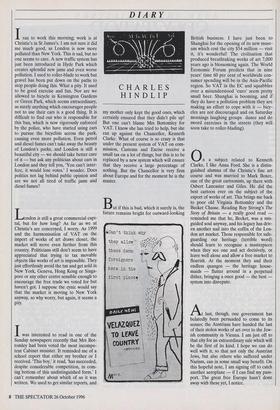DIARY
CHARLES HINDLIP Iran to work this morning; work is at Christie's in St James's. I am not sure it did me much good, as London is now more polluted than New York. This is sad, but no one seems to care. A new traffic system has just been introduced in Hyde Park which creates splendid new jams and even worse pollution. I used to roller-blade to work but gravel has been put down on the paths to stop people doing this. What a pity. It used to be good exercise and fun. Nor are we allowed to bicycle in Kensington Gardens or Green Park, which seems extraordinary, as surely anything which encourages people not to use their cars is a good thing. It is difficult to find out who is responsible for this ban, which is now rigorously enforced by the police, who have started using cars to pursue the bicyclists across the park, causing even more pollution. Even petrol and diesel fumes can't take away the beauty of London's parks, and London is still a beautiful city — we should take better care of it — but ask any politician about cars in London and they tell you, 'You can't inter- fere, it would lose votes.' I wonder. Does politics not lag behind public opinion and are we not all tired of traffic jams and diesel fumes?
London is still a great commercial capi- tal, but for how long? As far as we at Christie's are concerned, I worry. As 1999 and the harmonisation of VAT on the import of works of art draws closer, the market will move even further from this country. Politicians still don't seem to have appreciated that trying to tax movable objects like works of art is impossible. They just effortlessly avoid the tax and get sold in New York, Geneva, Hong Kong or Singa- pore or any other centre sensible enough to encourage the free trade we voted for but haven't got. I suppose the cynic would say that the market is moving to New York anyway, so why worry, but again, it seems a pity.
Iwas interested to read in one of the Sunday newspapers recently that Mrs Bot- tomley had been voted the most incompe- tent Cabinet minister. It reminded me of a school report that either my brother or I received. 'This boy,' it read, 'has succeeded, despite considerable competition, in com- ing bottom of this undistinguished form.' I can't remember about which of us it was written. We used to get similar reports, and my mother only kept the good ones, which certainly ensured that they didn't pile up! But one can't blame Mrs Bottomley for VAT. I know she has tried to help, but she ran up against the Chancellor, Kenneth Clarke. What of course is so crazy is that under the present system of VAT on com- mission, Customs and Excise receive a small tax on a lot of things, but this is to be replaced by a new system which will ensure that they receive a large percentage of nothing. But the Chancellor is very firm about Europe and for the moment he is the master.
But if this is bad, which it surely is, the future remains bright for outward-looking British business. I have just been to Shanghai for the opening of its new muse- um which cost the city $54 million — visit it, it's wonderful! The civilisation that produced breathtaking works of art 7,000 years ago is blossoming again. The World Economic Forum predicts that in nine years' time 60 per cent of worldwide con- sumer spending will be in the Asia-Pacific region. So VAT in the EC and squabbles over a misunderstood 'euro' seem pretty small beer. Shanghai is booming, and if they do have a pollution problem they are making an effort to cope with it — bicy- cles are not discouraged and on Saturday mornings laughing groups dance and do sword exercises in the streets (they will soon take to roller-blading).
On a subject related to Kenneth Clarke, I like Anna Ford. She is a distin- guished alumna of the Christie's fine art course and was married to Mark Boxer, one of the great cartoonists, up there with Osbert Lancaster and Giles. He did the best cartoon ever on the subject of the export of works of art. This brings me back to poor old Virginia Bottomley and the Becket Chasse. Reading Roy Strong's The Story of Britain — a really good read reminded me that he, Becket, was a mis- guided soul anyway, and his legacy has driv- en another nail into the coffin of the Lon- don art market. Those responsible for safe- guarding our heritage (terrible word) should learn to recognise a masterpiece when they see one and act decisively, or leave well alone and allow a free market to flourish. At the moment they and their endless quangos — the heritage house- maids — flutter around in a perpetual dither, bringing a once good — the best system into disrepute.
Alast, though, one government has belatedly been persuaded to come to its senses: the Austrians have handed the last of their stolen works of art over to the Jew- ish community in Vienna. I am just off to that city for an extraordinary sale which will be the first of its kind. I hope we can do well with it, so that not only the Austrian Jews, but also others who suffered under Nazism, can in some small way benefit. On this hopeful note, I am signing off to catch another aeroplane — if I can find my pass- port. The great free Europe hasn't done away with these yet, I notice.


















































































 Previous page
Previous page